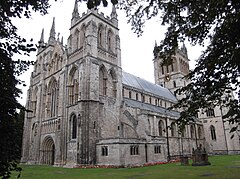Selby, Yorkshire
| Selby | |
|---|---|
 Selby Abbey |
|
 Arms of Selby District Council |
|
| Selby shown within North Yorkshire | |
| Population | 14,731 (2011 Census) |
| OS grid reference | SE614323 |
| • London | 162 mi (261 km) SE |
| Civil parish |
|
| District | |
| Shire county | |
| Region | |
| Country | England |
| Sovereign state | United Kingdom |
| Post town | SELBY |
| Postcode district | YO8 |
| Dialling code | 01757 |
| Police | North Yorkshire |
| Fire | North Yorkshire |
| Ambulance | Yorkshire |
| EU Parliament | Yorkshire and the Humber |
| UK Parliament | |
| Website | www.selbytowncouncil.gov.uk |
Selby is a town and civil parish in North Yorkshire, England. Situated 14 miles (22.5 km) south of the city of York, along the course of the River Ouse, Selby is the largest and, with a population in 2001 of 13,012, most populous settlement of the wider Selby local government district. The town population had increased at the 2011 census to 14,731.
Historically a part of the West Riding of Yorkshire, much of the wealth of the town was facilitated via Selby's position upon the banks of the River Ouse. In the past, Selby had a large shipbuilding industry and was an important port, for the most part due to the Selby Canal which brought trade from the city of Leeds. Selby is home to Selby Town F.C. who play in the Northern Counties East Football League.
The town’s origins date from the establishment of a Viking settlement on the banks of the River Ouse. Archaeological investigations in Selby have revealed extensive remains, including waterlogged deposits in the core of the town dating from the Roman period onwards. It is believed that Selby originated as a settlement called Seletun which was referred to in the Anglo-Saxon Chronicle of AD 779.
The town of Selby, a sizeable town on the main route north from the Midlands, is the traditional birthplace of King Henry I, fourth son of William the Conqueror, in 1068/69; the connection is supported by William and his wife Matilda's unique joint charter of Selby Abbey, far to the north of their usual circuit of activities, which was founded for Benedict of Auxerre in 1069 and subsequently supported by the de Lacy family. King Henry I is reputed to have been born there in either 1068 or 1069. A notable feature of the abbey is the 14th century Washington Window, featuring the heraldic arms of the ancestors of George Washington, the first president of the United States. The design is often cited as an influence for the Stars and Stripes flag.
...
Wikipedia

